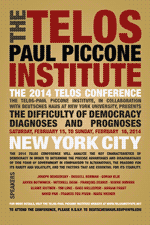The following paper was presented at the Eighth Annual Telos Conference, held on February 15–16, 2014, in New York City.
 In the following, I address the question of Venezuelan democracy under the fourteen-year mandate of recently deceased President Hugo Chávez from the philosophical perspective of Karl Marx’s The Eighteenth Brumaire to Louis Bonaparte. Recent Latin American history of the past twenty years has seen a resurgence of leftist governments sympathetic to Cuba’s Marxist revolutionary ideals of the 1960s, where Venezuela is no exception. Focusing on one particular event in Venezuela’s contemporary history, I wish to accomplish two things. The first is to convince my audience that Nicolás Maduro’s inauguration ceremony of his then newly appointed presidential cabinet in late-April 2013 is the sharpest expression of the current failed state and non-direction of Chavismo in Venezuela, or more precisely, what I call the dissolution of its sensus communis. Second, I wish to advance a philosophical question for discussion among audience members, namely, does replicating a historically prior political ideology ever secure success for democracy within present historical circumstances; more succinctly, in other words, do anachronistic political experiments produce volatile democracies?
In the following, I address the question of Venezuelan democracy under the fourteen-year mandate of recently deceased President Hugo Chávez from the philosophical perspective of Karl Marx’s The Eighteenth Brumaire to Louis Bonaparte. Recent Latin American history of the past twenty years has seen a resurgence of leftist governments sympathetic to Cuba’s Marxist revolutionary ideals of the 1960s, where Venezuela is no exception. Focusing on one particular event in Venezuela’s contemporary history, I wish to accomplish two things. The first is to convince my audience that Nicolás Maduro’s inauguration ceremony of his then newly appointed presidential cabinet in late-April 2013 is the sharpest expression of the current failed state and non-direction of Chavismo in Venezuela, or more precisely, what I call the dissolution of its sensus communis. Second, I wish to advance a philosophical question for discussion among audience members, namely, does replicating a historically prior political ideology ever secure success for democracy within present historical circumstances; more succinctly, in other words, do anachronistic political experiments produce volatile democracies?
 In the following, I wish to offer two reflections on the question of religion in Benjamin’s thought, the first of which pertains to the subject of translation, the second of which pertains to history. I will address the former first, for it is here, namely in Benjamin’s concept of “pure language,” that I have derived the eponymous notion of “pure religion.” These reflections will conclude in the form of open-ended questions, which I will elucidate at this time in order to orient my audience with regards to my stakes. The first question is whether the translatability of religious scripture is a condition of possibility for the multiplicity of world religions, and if so, what might the implications of this be. The second question, which I will distill from the first, is whether historicity, or what is in Benjamin the strife between historical materialism and historiography, grounds the essence, or “purity,” of religious experience.
In the following, I wish to offer two reflections on the question of religion in Benjamin’s thought, the first of which pertains to the subject of translation, the second of which pertains to history. I will address the former first, for it is here, namely in Benjamin’s concept of “pure language,” that I have derived the eponymous notion of “pure religion.” These reflections will conclude in the form of open-ended questions, which I will elucidate at this time in order to orient my audience with regards to my stakes. The first question is whether the translatability of religious scripture is a condition of possibility for the multiplicity of world religions, and if so, what might the implications of this be. The second question, which I will distill from the first, is whether historicity, or what is in Benjamin the strife between historical materialism and historiography, grounds the essence, or “purity,” of religious experience. 

